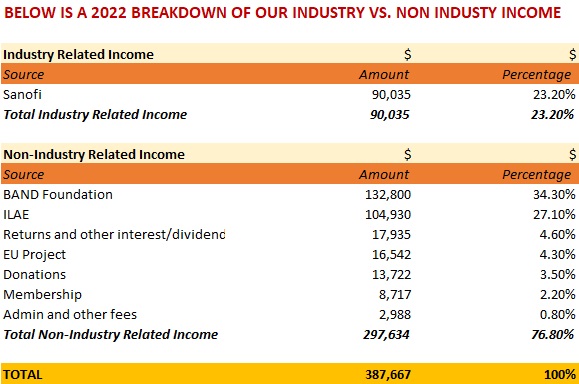Relationship with pharmaceutical companies
• The International Bureau for Epilepsy (IBE) is a Non-Govermental Body (NGO).
• Relationships between non-governmental organisations (NGOs) and pharmaceutical companies should be based on equal partnership. Both sides must work together on policy development and practical initiatives, in the interests of the patients and their carers whom the NGO represents, while preserving its independence.
• Each party should remember that successful partnerships are those where both partners gain something, and each should make efforts to understand the internal culture of the other.
• NGOs should recognise that pharmaceutical companies need to be profitable, and have their own particular marketing agenda, to which no NGO should ever feel obliged to conform. Funding should be rejected if the alternative is compromising the NGO’s independence in any way.
Funding
• The International Bureau for Epilepsy (IBE) encourages the use of available funding so long as the NGO’s independence is not compromised in any way and so long as the relationship is totally transparent. Contracts between the parties help in this respect.
• IBE is opposed to relationships designed to give one company competitive advantage over another and, where possible, prefers the use of funding consortia composed of two or more companies from the same industry.
• Joint research initiatives must ensure that independence is not eroded.
• IBE accepts funding from the pharmaceutical industry or private companies when:
-
- • it believes it will result in benefit to IBE;
-
- • the Board is satisfied that accepting the funds will not attract adverse publicity;
-
- • the funder does not try to coerce or over-influence IBE’s policy or actions, either explicitly or implicitly
• A NGO’S good name is its most valuable asset. IBE’s name must not be used to imply approval or endorsement of any of the donor’s products or policies, without the Board’s prior written approval.
Product Endorsement
• IBE does not endorse any individual treatment; people living with epilepsy need the widest possible range of treatment options. These may include surgery, complementary therapies, neurostimulation, dietary therapies, lifestyle changes, and non-pharmaceutical products and other therapies;
• IBE encourages active partnership between patient, carer and health professional, as well as discussion of all available options to promote informed choice by the patient;
• IBE supports the proper licensing of medicines and believes that the marketing of non-drug treatments to the public requires similar rules and standards.

